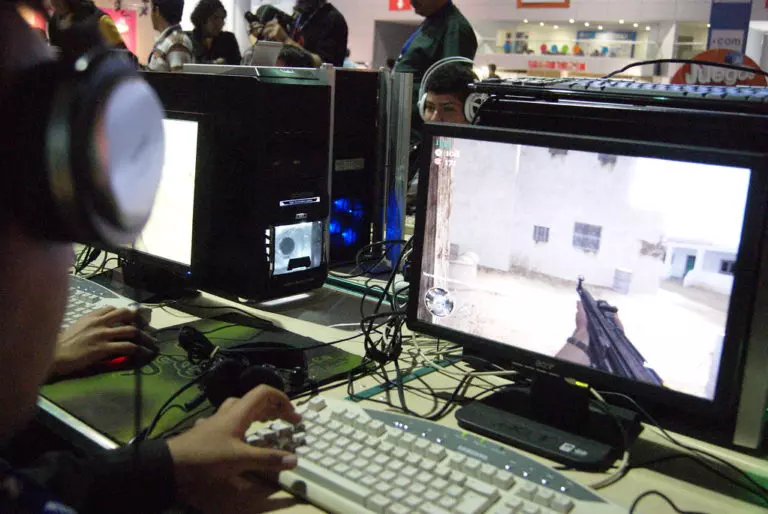
By Pedro Marin
In 2013, the Call of Duty franchise released a game that was set in Venezuela, and whose objective was to overthrow a leader who represented Hugo Chávez. The game was released under the name Call of Duty: Ghosts.
This type of project became popular in the US cultural industry just when Washington was beginning to classify Venezuela as an “unusual and extraordinary threat”, making it clear that the objective was to manufacture consent to legitimize US aggressiveness against the Latin American country. .
Maybe that’s why saying that the game is clearly an American propaganda tool might not seem like the most surprising thing in the world; however, accounting for the obvious is not enough. It is important to have the information to support such a claim.
Thanks to an investigation by journalist Alan MacLeod at Mintpress News, based in turn on documents obtained by journalist Tom Secker through the Freedom of Information Act, we can learn the details of the connection between the creators of Call of Duty and the US government, as well as the intention that this type of game promotes US national security interests.
Washington’s interest in getting recruits through the games
Activision Blizzard is the company behind the Call of Duty franchise. It has released other famous titles in the gaming world, including Guitar Hero, Warcraft, Starcraft, the Tony Hawk’s Pro Skater series, Crash Bandicoot and Candy Crush Saga. However, the producer’s star is Call of Duty, responsible for 76% of its annual revenue.
The documents cited by MacLeod reveal that the US military collaborates with the company so that it can develop its products. One example is the production of Call of Duty: Modern Warfare 3 and Call of Duty 5, which had the support of the United States Marine Corps (USMC). After soliciting support from the USMC during the E3 entertainment convention in Los Angeles in 2010, the game’s producers were granted access to hovercrafts (airboats), a tank and a C-130 plane.
Two years later, the USMC returned to collaborate with the production of Modern Warfare 4, and Activision Blizzard producers had access to air and ground military vehicles. Such war machines are present in the game.
The collaboration continued throughout the decade. MacLeod’s article mentions an episode from September 2018. On this occasion, the US Air Force invited the game’s producer, Coco Francini, along with a group of entertainment executives, to its headquarters in Hurlburt Field, Florida. According to the verified documents, the Air Force was interested in showing its “hardware” to this group so that the entertainment industry would be a more credible defender of the US war machinery.
Francini was able to observe the operation of CV-22 helicopters and AC-130 planes, which appear in the Call of Duty franchise.
An Air Force official wrote the following about the group in an email: “We have a lot of people working on future blockbusters (Marvel, Call of Duty, etc.) excited about this trip”, while in another email it is said that the The purpose of the visit was “to provide ‘heavyweight’ producers with an ‘immersion in the Air Forces Special Operations Command (AFSOC) focused on special tactical aviators and air-to-ground capabilities,’ says the article.
Another part of MacLeod’s text quotes journalist Tom Secker’s opinion on the collaboration between the US military and the gaming company. Secker says that by doing so, the Armed Forces achieve a positive image that can lead to more recruitment. “For certain demographics of gamers, it’s a recruitment portal, some first-person shooters have ads integrated into the games themselves. […] Even without that kind of overt recruiting effort, games like Call of Duty make war feel fun, exciting, an escape from the monotony of your daily life,” says Secker.
Top White House officials end up in the gaming industry
The links between US state power and the games industry do not stop at the aforementioned collaborations. There are former US government employees who now work at Activision Blizzard, a pattern that recurs at social media companies, about which MintPress has other published investigations.
In this case, the article begins with Activision Blizzard’s top advisor: Frances Townsend. Before joining the company, she “spent her life working her way up the ladder of the national security state,” according to MacLeod. Townsend served as Chief of Intelligence for the Coast Guard, and Condoleezza Rice named her Assistant Secretary of State for Counterterrorism in 2003. A year later, she became a member of President George W. Bush’s Intelligence Advisory Board. MacLeod summarizes Townsend’s tenure in the White House: “As the White House’s top adviser on terrorism and national security, Townsend works closely with Bush and Rice, and has become one of the faces of that administration’s war on terrorism. One of her main achievements was to bring the American public into a constant state of fear by the alleged threats of further Al-Qaeda attacks (which never came to pass).”
Frances Townsend also works with other influential organizations in US foreign policy: the Atlantic Council, the Center for Strategic and International Studies, and the Center for Foreign Affairs.
The article also mentions another key Activision Blizzard employee who works for the Atlantic Council: Chance Glasco, non-resident lead member of the think-tank. In the gaming industry, Chase is the co-founder of Infinity Ward, the studio that developed Call of Duty. And also Dave Anthony, another non-resident member of the Atlantic Council who joined the group in 2014. His work as writer and director of Call of Duty: Black Ops was very important to the success of the franchise.
About Anthony, says MacLeod: “he makes no secret of the fact that he collaborated with the US national security state while creating the Call of Duty franchise. ‘My greatest honor was to have consulted with Colonel Oliver North about the history of Black Ops 2’, he declared publicly, adding: ‘there are several small details that we would never have known about if it weren’t for your participation’”.
As a member of the National Security Council, Oliver North managed money from the Iranian government’s arms sales that would later be used to finance armed groups in Nicaragua to attack the Sandinista government, in the famous Iran-Contra scandal of the 1980s.
Activision Blizzard’s questionable signings, however, don’t end there. Added to these employees are Brian Bulatao and Grant Dixon. The former was director of operations for the CIA under Mike Pompeo, and followed him to the US State Department when Pompeo was named Secretary of State in the Trump administration. There, Bulatao held the post of undersecretary of state for management.
MacLeod writes that Bulatao’s former co-workers described him “as a ‘bully’ who brought a ‘cloud of intimidation’ over the workplace, repeatedly pressing them to ignore possible wrongdoing in the department.”
After the end of Donald Trump’s term, Activision Blizzard hired Bulatao, even though he had no prior gaming experience. He holds the position of managing director in the company.

Grant Dixon, who is currently the firm’s chief legal officer, was President George W. Bush’s associate attorney from 2003 to 2006. Dixon advised him “on many of the most controversial activities of his administration (such as torture and the rapid expansion surveillance state,” according to the article.
The Activision Blizzard attorney has also held the posts of senior vice president, general counsel and corporate secretary for weapons maker Boeing.
Manipulating players into defending the American view of the world

At the beginning of this text, we talked about the particular mission of the game Call of Duty: Ghosts. Killing presidents or leaders of countries that do not share US policy is a recurring virtual challenge to which franchise consumers are exposed. In the previous game, Call of Duty Black Ops (2010), players must kill Cuban leader Fidel Castro to complete his mission. MacLeod details that if the player’s shot is aimed at the leader’s head, they are rewarded “with an extra gory scene in slow motion, and obtain a bronze ‘Death to Dictators’ trophy”.
The last game in the series debuted less than a month ago and follows the same line. In Call of Duty: Modern Warfare II, users are invited to throw a missile at a character named Ghorbrani, a reference to Iranian General Qassem Soleimani, who was assassinated by a United States Air Force strike in 2020. The game also features with some Russians with whom the fictitious general reaches an agreement for the supply of arms.

The franchise not only celebrates the greatest crimes committed by the US government, but also falsifies situations in favor of US propaganda, taking advantage of the fact that the stories are fictional.
In Call of Duty: Modern Warfare (2019), events unfold in an invented Middle Eastern country, which obviously illustrates Syria during the war. In the story, US and British troops arrive to fight against al-Qatala militants, a reference to al-Qaeda, but the plot also puts the player to fight against “Russian terrorists” who, according to the game, kill the civilian population and use chemical weapons.
There is a mention of “death road” in the game. In the work, it is said that the Russians fired on the road, which was used for the evacuation of civilians. There really was such an episode in history, but it has nothing to do with Russia. In that event, which took place during the Gulf War in Iraq, the US military fired on surrendering and fleeing Iraqi soldiers, killing hundreds of them.
Call of Duty is not a little-known or fringe game series, but one of the biggest and most popular games in the industry. In 2020, it brought nearly 2 billion USD in profits to its developers. So the ideological impact it has on its consumers around the world is clearly important, whether it’s winning over new recruits or just championing the American worldview. Secker, consulted by MacLeod on the “road of death”, explains: “In a culture where most people’s exposure to games (and movies, television shows, etc.) is far greater than their knowledge of historical events and nowadays, these manipulations help to demarcate the emotional, intellectual and political reactions of the players. This helps convert them into more general advocates of militarism, even if they don’t enlist.”
The franchise was considered for a long time one of the main spokespersons of American propaganda. The details about the connections between its creators, the Pentagon and the US government illustrate why very well.
Originally published in Opera Magazine
Join our WhatsApp group, clicking on this link
Join our Telegram channel, click this link
Source: https://www.diariodocentrodomundo.com.br/call-of-duty-o-videogame-como-propaganda-de-guerra-do-pentagono/

